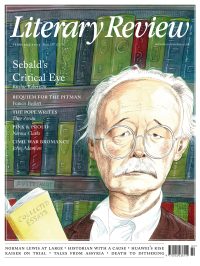Nigel Andrew
A Mine of Information
Under a Metal Sky: A Journey Through Minerals, Greed and Wonder
By Philip Marsden
Granta Books 342pp £20
Did you know that a single ounce of gold can be stretched out into fifty miles of filigree thread? Or that there were once plans to build a radium spa at St Ives in Cornwall? Or that the drink we know as 7Up was originally enriched with cheering lithium and called 7Up Lithiated Lemon Soda? Or that 80 per cent of all living creatures on earth are nematodes? These are just a few of the mind-boggling facts that crop up in Philip Marsden’s new book. But this is no ‘believe it or not’ compendium. It is a deeply thoughtful, well-written and illuminating journey through the world of minerals and an exploration of their impact on the life and history of our planet.
Marsden structures his book around eleven minerals – ochre, tin, peat (which fuelled the Dutch golden age and yields a form of iron known as ‘bog iron’), bronze, silver, radium, aerolite (the metal of meteorites), mercury, copper, gold and lithium – each of which has a chapter to itself. In pursuit of these, he travels from his home county of Cornwall – which, at the height of its mining boom, had more engine houses than the rest of the world put together – to the Netherlands, where Cornish pumping engines helped to reclaim the land from the sea, to Jáchymov in the Czech Republic, where radium spas are still doing good business, to Prague, once the world centre of alchemical research, to the former silver-mining town of Stolberg in the Harz Mountains of Germany, which Goethe visited as commissioner of mines of Saxe-Weimar, to Idrija in Slovenia, the source of 13 per cent of the world’s mercury, to Mitterberg in the Austrian Alps, where copper was mined in the Bronze Age, and to a remote mountain region of Georgia where gold was mined as early as 3000 BC.
In boyhood, Marsden, like many others, collected rocks and fossils. His early interest in these fed into something more profound, giving him a sense of ‘breaking through into another realm’ and a realisation that the physical and the spiritual realms are connected ‘through the imagination and the infinite complexity

Sign Up to our newsletter
Receive free articles, highlights from the archive, news, details of prizes, and much more.@Lit_Review
Follow Literary Review on Twitter
Twitter Feed
Under its longest-serving editor, Graydon Carter, Vanity Fair was that rare thing – a New York society magazine that published serious journalism.
@PeterPeteryork looks at what Carter got right.
Peter York - Deluxe Editions
Peter York: Deluxe Editions - When the Going Was Good: An Editor’s Adventures During the Last Golden Age of Magazines by Graydon Carter
literaryreview.co.uk
Henry James returned to America in 1904 with three objectives: to see his brother William, to deliver a series of lectures on Balzac, and to gather material for a pair of books about modern America.
Peter Rose follows James out west.
Peter Rose - The Restless Analyst
Peter Rose: The Restless Analyst - Henry James Comes Home: Rediscovering America in the Gilded Age by Peter Brooks...
literaryreview.co.uk
Vladimir Putin served his apprenticeship in the KGB toward the end of the Cold War, a period during which Western societies were infiltrated by so-called 'illegals'.
Piers Brendon examines how the culture of Soviet spycraft shaped his thinking.
Piers Brendon - Tinker, Tailor, Sleeper, Troll
Piers Brendon: Tinker, Tailor, Sleeper, Troll - The Illegals: Russia’s Most Audacious Spies and the Plot to Infiltrate the West by Shaun Walker
literaryreview.co.uk